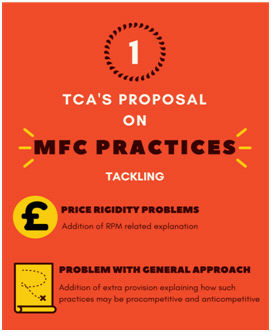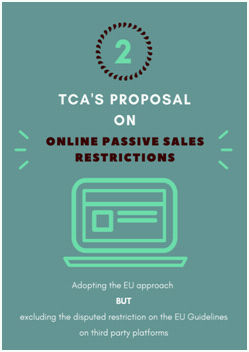The Turkish Competition Authority (the TCA) recently announced amendment of the Guidelines on Vertical Agreements (Guidelines) and opened the draft Guidelines to public discussion. In recent days, various stakeholders had the chance to submit their thoughts to the TCA. Now we are waiting for the final account of the TCA on the proposed amendments.
There were two important issues that the TCA touched upon in the draft Guidelines; assessment of most favored customer clauses (MFC) and evaluation of online passive sale restrictions. Below we provide a brief summary on the aforementioned matters together with other topics subject to discussion.
What is MFC and why is it important?
MFC refers to practices which restrict a contracted seller from offering more favorable prices or conditions through its own means or to other customers. MFC practices are often classified in three groups as follows:
- Wide MFC practices; referring to restrictions placed to the sellers in relation to offers provided to competing entities
- Narrow MFC practices; referring to restrictions placed to the sellers itself for offers provided through their own sales channels
- MFC+ practices; requiring seller to provide best offers to the contracted entity
MFC practices are not evaluated as per se infringements. However, they have recently attracted the attention of various competition authorities across the globe, especially with the rapid rise of e-commerce all over the world.
In Turkey, adoption of such practices by various e-commerce platforms have been under close scrutiny - explaining the reasoning behind the TCA's efforts towards providing further explanation on their assessment from the competition law perspective.
What does the TCA propose on MFC practices?
 The draft Guidelines concentrate on two
main aspects of MFC practices; potential price rigidity problems
associated with such practices and general approach to MFC
practices from the point of view of vertical agreements.
The draft Guidelines concentrate on two
main aspects of MFC practices; potential price rigidity problems
associated with such practices and general approach to MFC
practices from the point of view of vertical agreements.
With regard to the concerns on price rigidity, the TCA proposes to add an explanation stipulating that MFC practices having the effect to reduce the motivation of entities that are not part of such practices to seek better prices and conditions may increase the likelihood of direct or indirect resale price maintenance.
The TCA adopts the European Commission's approach which lists obligation to apply MFC as measures which may reduce the buyer's incentive to lower the resale price and thus increase likelihood of direct or indirect price fixing.
Moving on, different from the EU, the TCA adds further explanation on the general approach adopted towards such practices. In this regard, the TCA provides a brief explanation on how such practices can be pro-competitive as well as anti-competitive, noting the need to take into consideration the market position and power of the entities benefiting from such practices as well as their competitors, the reasoning behind the adoption of such practices and the characteristics of the practice against the dynamics of the market. Overall, the TCA suggests that the MFC practices may be regarded as anticompetitive if the following conditions are present:
- The said practices are retrospective practices which ensure the entity imposing the MFC practice to benefit at all times or increase the cost of the contracted seller to provide further discounts or favorable conditions to entities competing with the contracted entity.
- The contracted parties of an MFC practice have a considerably higher market share and power when compared to other players in the market.
- The concentration level in the relevant market subject to MFC practices is rather high.
In sum, the draft Guidelines seeks to take a step forward in the international arena towards providing a certain extent of information on how MFC practices should be assessed from the competition law perspective. It must be noted here that the evaluation of the TCA may be setting a precedent for other authorities who seek to tackle the MFC-related competition problems.
What about online passive sale restrictions?
Passive sales constitute "fulfilling demands of customers from the region or customer group of another buyer and which are not results of active efforts by the buyer" and restriction of passive sales are restricted under Turkish competition rules. The current Guidelines fail to provide in depth explanation on how the passive sales matter should be dealt with for online sales. It merely provides that online sales constitute passive sales.
Noticing the ever-increasing significance of "living online," the TCA proposes to align its approach with the European Commission's approach. However, whilst aligning its approach, it leaves the current "hot topic" across Europe out of the scope of its proposal.
In-scope vs out-of-scope
 As an extension of the general
provision concerning online sales as passive sales, the draft
Guidelines suggest that the following conditions shall be listed as
hardcore restrictions of passive selling:
As an extension of the general
provision concerning online sales as passive sales, the draft
Guidelines suggest that the following conditions shall be listed as
hardcore restrictions of passive selling:
- Agreeing that the (exclusive) distributor shall prevent customers located in another (exclusive) territory to view its website or shall put on its website automatic routing of customers to the manufacturer's or other (exclusive) distributors' websites
- Agreeing that the (exclusive) distributor shall terminate consumers' transactions over the internet once their credit card data reveal an address that is not within the distributor's (exclusive) territory
- Agreeing that the distributor shall limit its proportion of overall sales made over the internet
- Agreeing that the distributor shall pay a higher price for products intended to be resold by the distributor online than for products intended to be resold off-line
On the flip side, the draft Guidelines stipulate that criteria may be imposed to the sellers by suppliers who make online sales in order to preserve the brand image and standard of quality of the distribution network of the supplier. In this regard, it suggests that certain extra services may be required to be provided through online platform or that online re-sellers may be expected to also make sales through brick and mortar shops or showrooms. Moreover, the draft Guidelines note that suppliers may foresee sales of goods from certain third-party platforms that meet certain standards or conditions. On this note, the draft Guidelines provide that any criteria that has the effect of deterring online sales will be regarded as hardcore restriction of passive selling.
What is left out of the scope of the proposed amendments concern the below provided restriction example set in the European Commission's Guidelines for standards/conditions set in relation to third party platforms.
"For instance, where the distributor's website is hosted by a third-party platform, the supplier may require that customers do not visit the distributor's website through a site carrying the name or logo of the third-party platform."
The relevant provision has sparked a controversial debate as per the EU Court of Justice's Attorney General's opinion on the Coty Case before the EU Court of Justice and is subject to debate before many other institutions.
The TCA stays clear from the relevant provision likely because it is a controversial provision interpreted and examined by different competition authorities and courts across Europe as well as the US in varying ways; while one institution regards it as a pro-competitive provision holding interests of especially luxury brands, another notes that the provision may hinder inter-brand competition especially for small-medium sized enterprises.
What are other proposed amendments?
The draft Guidelines suggests two other amendments – one concerns selective distribution system and the second concerns agency relationships.
With regard to selective distribution system, the existing provisions are restructured in relation to online sales. In this regard, the draft Guidelines stipulate that agreements including restriction of online sales to end-users shall not benefit from block exemption. Moreover, in relation to the currently available restriction placed on a system-member buyer towards changing or opening a new sales point (stemming from the significance of having brick and mortar shops or showrooms for success of a selective distribution system), the TCA clarifies assessment of online sales. In this regard, the TCA suggests that a new website created by the system-member buyer for online sales does not constitute opening a new sales point.
In relation to the agency relationships, the TCA suggests that a contradiction exists for interpretation of the current provision on non-compete clauses within the scope of agency agreements and the remaining vertical agreements. Accordingly, the draft Guidelines seeks to reconcile the contradiction by proposing to add that non-compete clauses available in agency agreements must also be considered within the scope of Article 4 of the Competition Act as they concern intra-brand competition.
Overall, even though the TCA's effort towards clarifying the legislation has been praised by the majority of the stakeholders, it has created certain tensions between online sales platforms and wholesalers/ retailers. If you are interested in the final outcome, stay tuned!
The content of this article is intended to provide a general guide to the subject matter. Specialist advice should be sought about your specific circumstances.
We operate a free-to-view policy, asking only that you register in order to read all of our content. Please login or register to view the rest of this article.


